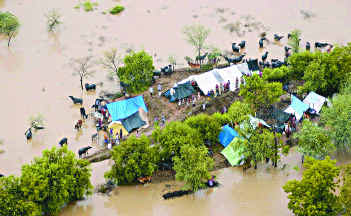Even as the attacks on the minorities continue relentlessly, the BJP government’s priority in Gujarat appears to be holding Assembly elections rather than providing relief and rehabilitation.
DIONNE BUNSHA
in Panchmahal and Vadodara
Around 1.5 lakh refugees are stranded in Gujarat’s relief camps. Several people die in violence here everyday adding to the 800-odd killed so far. Chief minister Narendra Modi sat back while VHP, Bajrang Dal and BJP workers orchestrated targeted attacks across the state, killing and hounding Muslims out of their villages and ghettos. The attacks continue relentlessly in Ahmedabad and other parts of north and central Gujarat. Police barge into Muslim houses and harass them as part of ‘combing operations’. Villagers whose homes have been destroyed are living in the open fields. There is no way out for the homeless refugees in relief camps. They cannot return to their homes or start work again.
Read more

